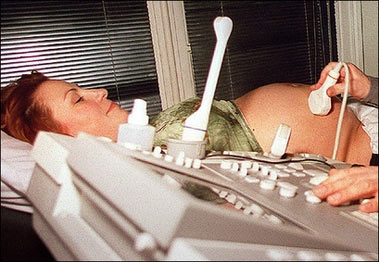Psychotherapy can help restore fertility in women who become so stressed from
managing their busy lives that they stop ovulating, a conference heard.

A
pregnant woman receives a prenatal screening. Psychotherapy can help
restore fertility in women who become so stressed from managing their busy
lives that they stop ovulating, a conference heard.
[AFP] |
Fertility experts have long wondered why women who are active, young and
otherwise healthy suddenly become infertile, a condition called anovulation.
The causes are sometimes attributed to hormone changes caused by too much
exercise or undernutrition, and often the woman is given hormone treatment, such
as oral contraception if immediate fertility is not desired, or ovulation
induction if it is.
But Sara Berga, a professor of gynecology and obstetrics at Emory University
in Atlanta, presented preliminary research which suggests that, among such
women, the cause of anovulation lies with stress and it can be reversed through
psychological help.
Berga's team looked at 16 women who were of normal weight who had not
menstruated for more than six months.
Some were perfectionist types whose lifestyle, either at home or at work,
placed them under a lot of stress, while others felt overwhelmed by the demands
their lives made on them.
The 16 had functional hypothalamic amenorrhea (FHA), a type of infertility
caused by a prolonged reduction in a hormone that initiates a molecular cascade
that leads to ovulation.
The telltale, though, was analysis of the women's spinal fluid, which showed
high levels of cortisol, a hormone that is a marker of stress and is often
linked to depression, osteoporosis and other health problems.
The women were randomly divided into two groups. Half received cognitive
behaviour therapy (CBT) for 20 weeks -- psychological counselling designed to
help them put their problems in perspective. The other half were simply
observed.
"A staggering 80 percent of the women who received CBT started to ovulate
again, as opposed to only 25 percent of those randomized to observation," Berga
told the annual conference of the European Society of Human Reproduction and
Embryology (ESHRE) in Prague.
In the CBT group, six regained full fertility and one showed some signs of
restored ovarian function. Two of the six became pregnant within two months.
In the non-CBT group, only one recovered her fertility, and one showed some
signs of ovarian function.
"This study underlines the important contribution that lifestyle factors play
in determining overall health and reproductive health in particular. To reverse
stress-induced ovulation, it is not enough simply to address metabolic sources
of stress," said Berga
Berga pointed out the cost and side effects of conventional hormone treatment
as compared to CBT. None of the 16 women gained weight or showed important
shifts in levels of leptin, a hormone linked to weight gain or metabolic change.
The next step will be to widen the research with a larger number of he women.
"If the larger scale study confirms our earlier results, we will have very
strong evidence for offering stress reduction as an effective therapy for a
significant group of fertile women," said Berga.